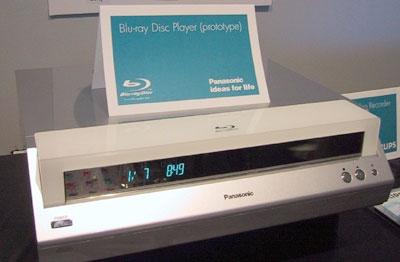Next-Generation DVD

The forces competing to win the prize of the next-generation DVD - the disc that will carry high-definition movies and other HD content - squared off with competing press conferences on the first day of the 2005 International Consumer Electronics Show. As in exhibition sports, they played real ball, but the score counted little toward the championship. Both press conferences opened with a high-impact montage of action-film clips from supporting movie studios, but they diverged remarkably from there. This Panasonic Blu-ray Disc player was the best-looking of several major-brand BD models at CES. Price and availability were still not set. (Photo by Rich Warren)
The competition pits the 50-gigabyte (GB) Blu-ray Disc against the 30-GB HD DVD. Both formats use higher-frequency blue lasers instead of the red lasers in ordinary DVD players, but the composition of a Blu-ray Disc (BD) is radically different from ordinary DVDs, while HD DVD retains many of the same characteristics. This similarity will enable manufacturers to press HD DVD discs in existing plants, with some modifications, while BDs require completely new equipment. Both sides claim that their new high-definition players will also play existing DVDs - though neither type of high-def disc will be playable in existing DVD players, at least at first.
Blu-ray Takes the OffensiveThe Blu-ray advocates assembled in a conference room at the Las Vegas Convention Center . During the opening remarks executives crowed that Electronic Arts, Vivendi Universal Games, and Sun Microsystems had joined the 100-member BD consortium, following an even bigger name - Disney - that signed on last month. Then they took off the gloves and pounded rival HD DVD, stressing that Blu-ray is more technologically advanced, more easily recordable, and has more connectivity for gaming - and that a miniature 8-cm BD with 15-GB capacity already exists for camcorders. They also revealed that a backward-compatible, eight-layer BD was being developed in the lab. An offhand reference to uncompressed audio soundtracks caused surprise since everybody had assumed that BD would use the existing Dolby Digital and DTS compressed audio formats.
- Log in or register to post comments





























































